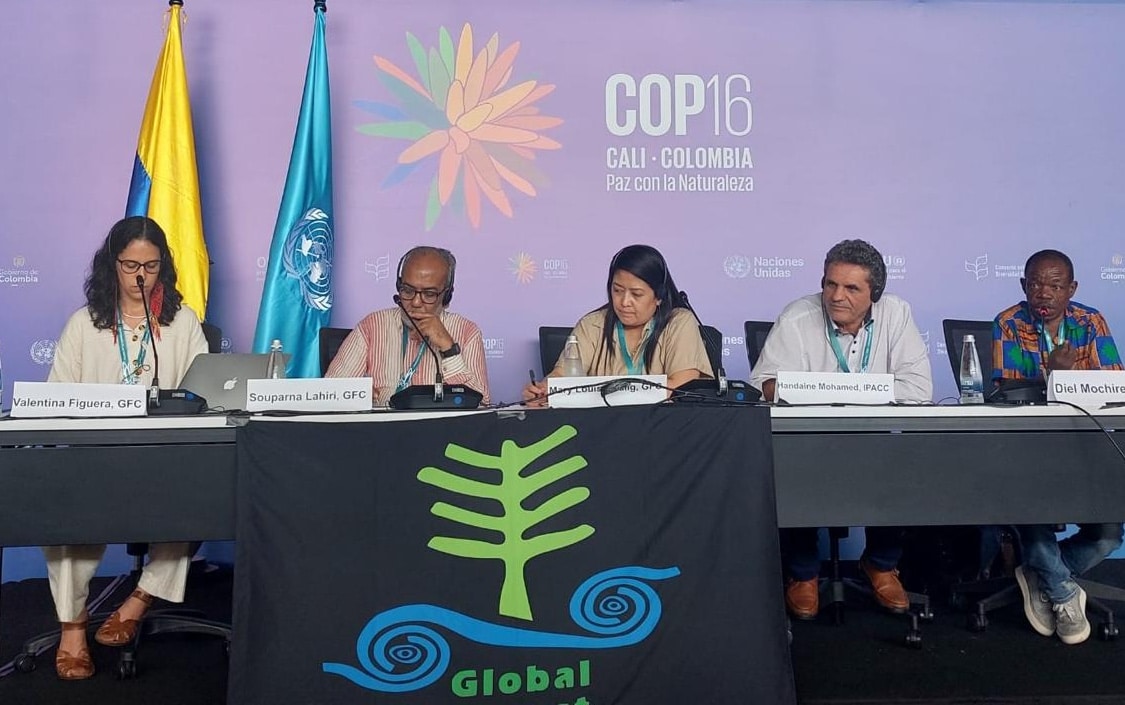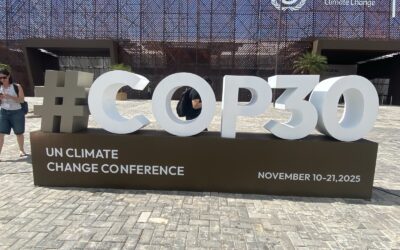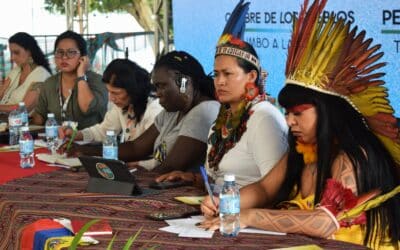23 October 2024 — Members and leaders from the Global Forest Coalition held a press conference today at the UN Biodiversity Conference (COP16) highlighting the need for countries to focus on real, community-led solutions to the biodiversity crisis and resist corporate lobbying and the commodification of nature.
GFC’s political director, Mary Louise Malig of the Philippines, explained that false solutions to the biodiversity crisis are ineffective and do real harm to communities and nature:
False solutions are destructive; they’re not just bad ideas. They are actively destroying and preventing real solutions to stopping biodiversity loss… Biodiversity offsets split up the elements of nature to commodify them using the market mindset. The thinking is that you can put a price on everything you see in a jungle or forest; you can sell it, trade it, or exchange it. This is not true; this is a fallacy.
As governments and civil society groups meet in Cali, Colombia, to assess progress on commitments under the Global Biodiversity Framework, GFC is a leading voice in favor of rights-based forest and biodiversity protection, as opposed to fortress-style conservation and harmful biodiversity offset schemes that allow business as usual to continue.
Leaving biodiversity protection up to market forces, Malig explained, is not an option:
False solutions and deforestation are the main sources of biodiversity loss. To halt them, we must recognize and strengthen the rights of Indigenous peoples, local communities, and women who have preserved forests, biodiversity, and ecosystems for centuries and are on the front lines of the crisis we are facing all over the world.
Malig mentioned agroecological practices as an example of a real solution to the twin crises of biodiversity loss and climate change, saying that the voices of women in particular should be at the forefront of the discussion on biodiversity.
Two representatives of GFC member groups spoke during the press conference; Dil Mochire from the Democratic Republic of the Congo and Handine Mohammed of Morocco. They pointed to the problems of illegal mining, water pollution, and loss of traditional knowledge about the environment.
Mochire described the armed conflict in the Democratic Republic of the Congo as an “economic war” that is cutting off resources for local communities in a nation known for massive biodiversity. He said that illegal mining is leading to land-grabbing and water scarcity. In places where the government has sought to designate protected areas, Indigenous peoples are dispossessed by fortress-style conservation:
Our country has developed mandates on protected areas, and the police protect them, and the Indigenous and local peoples aren’t informed. This creates conflict. They live in conditions where they don’t know where to go. Through the Global Biodiversity Framework, more protection can be ensured, and we can have more options to safeguard and ensure land tenure for Indigenous Peoples.
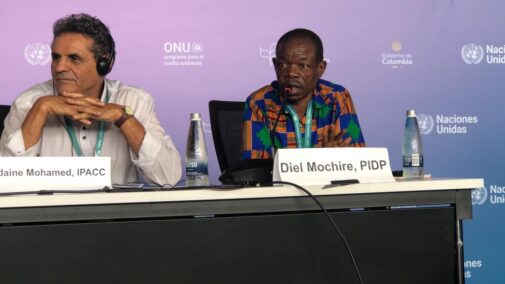
Handaine Mohammad of the Indigenous Peoples of Africa Coordinating Committee (IPACC) likened the CBD negotiations to a family squabble over who would pay for the prescription needed to save a sick grandmother. If the GBF is a promising roadmap that took so long to develop and can heal our relationship with biodiversity, he asked, why won’t countries fund it?
Mohammad also pointed out that countries need national legislation to support rights-based biodiversity and forest protection:
There’s the question of sharing the benefits, the implementation of the GBF, and the legislative framework at the international level. The problem is, how will countries change their legislation? We have many countries that don’t recognize Indigenous People. There has to be national legislation to adapt to the GBF.
He also called for language justice in the UN negotiations on biodiversity, particularly because the wisdom of local and Indigenous communities lies in local languages:
The problem is all the international agreements have to do with ancestral knowledge, but they don’t insist on including Indigenous languages. We can’t enjoy the water of the river if we close off the source. If we don’t have Indigenous languages, we will lose traditional knowledge.
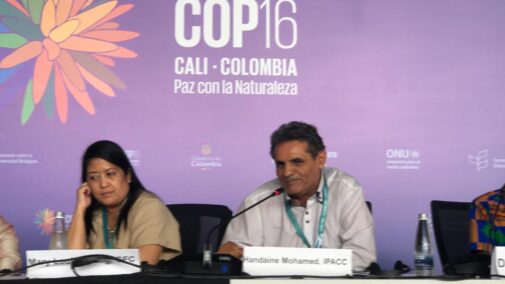
The member groups of the Global Forest Coalition are in Cali to call for a focus on real solutions to biodiversity loss, which they say cannot involve selling credits or offsets, which is essentially “paying to pollute.” This comes at the expense of the most vulnerable peoples, including women and forest communities.
Some of these schemes, like “nature-based solutions,” are attractive names for market mechanisms that are championed by the same industries that caused the biodiversity crisis, like fossil fuels and mining.
GFC senior climate advisor Souparna Lahiri spoke about biodiversity offsets, explaining:
it’s a blanket social license for corporations to destroy biodiversity and say we’ll pay for the destruction. This is not a framework to protect and conserve biodiversity. If it is to be transformed into a framework to really protect biodiversity and halt deforestation, it has to be inclusive and representative and consider the real solutions of Indigenous Peoples, local communities, and women.
He lamented the fact that these actors, who have proposed real solutions to tackle the root causes of biodiversity loss and not just treat its symptoms, are mostly absent from the negotiating table:
We talk of halting biodiversity loss, halting deforestation, resolving the climate and biodiversity crisis, but we don’t understand that the communities and people who can actually do it are not being included and represented in spaces where we negotiate. The language and the ambiance [of the UN] are so disrespectful to them, and we see this year after year.
Lahiri also said that progress has been slow because of lack of commitments:
The Aichi Targets haven’t been achieved, and it’s not due to a lack of finance; it’s a lack of political will and the corporate domination of policymaking. The governments have to answer to their people and communities. Until then, we can’t halt biodiversity loss and destruction.
This sentiment was echoed by Valentina Figuera Martinez, coordinator of the gender justice campaign at GFC, who characterized the slow pace of the negotiations as “frustrating.”
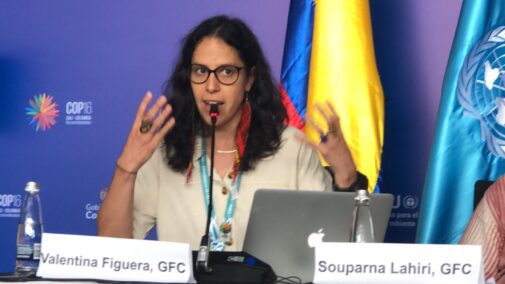
Martinez pointed out that governments—no matter their political stripes—often have a hand in subsidizing and supporting the corporations that are responsible for environmental destruction, and that civil society has the role of holding them responsible. She said:
There’s a disassociation of reality that we’re witnessing in many of the negotiations. If you really want to transform the GBF and have substantive changes to biodiversity and forest loss, you’d have more partnerships, and not with corporates, but with forest peoples, women’s groups, Indigenous and grassroots groups who are doing the work on the ground.
Many civil society organizations recently joined the GFC in signing a statement to support real solutions on biodiversity loss. That statement advocates for ecosystem approaches, prioritizing Indigenous Peoples’ rights, recognizing the rights of ecosystems, and elevating traditional knowledge and local leadership.
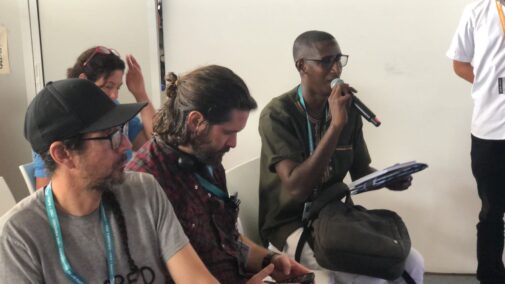
More information is at https://globalforestcoalition.org/cbd-cop16/.
GFC will hold another press conference in the Blue Zone on Tuesday 29 October, at 16:30 Colombia Standard Time (UTC-5).
For further interviews, additional materials, or more information, contact our media team:
Megan Morrissey (ENG/ESP) +12023656900, megan@
Ismail Wolff (ENG) +33 7 88 85 28 59 ismail.wolff@

